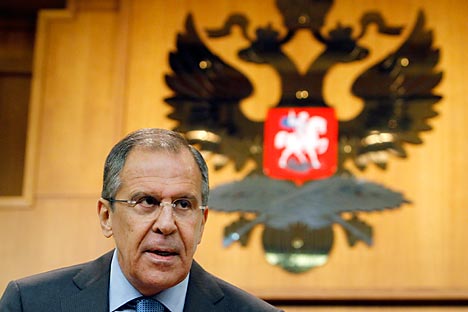Lavrov: The West is blackmailing Russia seeking adoption of a Syria resolution

Russia's Foreign Minister Sergei Lavrov: “To our great regret, we observe elements of blackmail.” Source: Reuters / Vostock Photo
Russian Foreign Minister Sergei Lavrov has accused the Western of blackmailing Russia in an attempt to pass a new UN Security Council Resolution on Syria
“To our great regret, we observe elements of blackmail. We are told: If you do not agree to adoption of the resolution under Chapter 7 of the UN Charter, we will not extend the mandate of the observer mission,” Lavrov said during a press conference in Moscow on July 16.
Related:
Moscow embarks on a dialogue with Assad’s opponents
Lavrov said Moscow considered this approach “absolutely counter-productive and dangerous, because it is inadmissible to use observers as bargaining chips.” Lavrov noted that the UN observer mission should investigate such incidents as the Tremseh massacre and said, in conclusion, Russia would stand firm in insisting that the Syria observer mission should continue.
Lavrov said that he is convinced the conflict in Syria is now splintering into a fight between religious and ethnic groups. He also said that a third force, Al Qaeda, had appeared in the armed confrontation. According to Lavrov, the outcome of the events in Syria will go a long way towards shaping the future settlement of internal conflicts within countries.
The foreign minister called the events in Syria “horrific.” “People are dying. Against this backdrop, statements have been made about who is to blame, what is to be done, about sanctions, the need for regime change and the need to support the popular revolution – this is how the actions of the armed opposition have come to be described. Yet, behind all this, one sense that something is lacking, a desire to put an immediate end to the violence and stop the bloodshed,” Lavrov said.
He stressed that the plan of the UN special envoy Kofi Annan is “the only viable platform for resolving the Syrian problems.” “To stop the violence, it is necessary to induce all the feuding sides to cease military actions simultaneously, synchronize withdrawal of heavy weapons and all the armed men from cities under the UN mission’s control,” Lavrov added.
According to Lavrov, the idea of some Western states that Russia should persuade Bashar Assad to resign as Syria’s president of his own accord is unrealistic.
“It has been suggested that Moscow holds the key to Syrian settlement. And when we ask what exactly that means, we are told that we should persuade Assad to resign of his own free will,” Lavrov said. “He will not go not, because we protect him but because he has a very significant section of the country’s population behind him.”
The situation in Syria took another turn for the worse on July 16, when the government army sent several armored columns into the southern neighborhoods of Damascus, where fighting between rebels and Assad supporters continues. The national armed forces are shelling the quarters occupied by the opposition forces.
Clashes between the supporters and opponents of the Syrian authorities began March 15, 2011 and have claimed between 12,000 and 17,000 lives. It is impossible to obtain a more precise estimate as the conditions on the ground in Syria do not permit independent reporting by journalists or aid groups.
First published in RBC Daily.
All rights reserved by Rossiyskaya Gazeta.
Subscribe
to our newsletter!
Get the week's best stories straight to your inbox